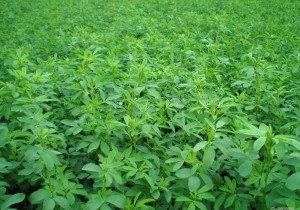Alfalfa, Medicago sativa, also called lucerne, is a perennial flowering plant in the pea family Fabaceae cultivated as an important forage crop in many countries around the world. The name alfalfa is used in North America.
Contents
Uses
Alfalfa is used for kidney conditions, bladder and prostate conditions, and to increase urine flow. It is also used for high cholesterol, asthma, osteoarthritis, rheumatoid arthritis, diabetes, upset stomach, and a bleeding disorder called thrombocytopenic purpura. People also take alfalfa as a source of vitamins A, C, E, and K4; and minerals calcium, potassium, phosphorous, and iron.
Benefits
Alfalfa has been used by the Chinese since the sixth century to treat several health conditions. It is considered the richest land source of trace minerals. Rich in vitamins, minerals and other nutrients Alfalfa makes an amazing herbal remedy. Its specific benefits include:
- Curing kidney problems, and relieving fluid retention and swelling.
- Curing auto-immune disorder.
- Healing arthritis.
- Nourishing the digestive, skeletal, glandular and urinary system.
- Cleansing the blood, liver and bowel.
- Lowering cholesterol levels.
- Preventing strokes.
- Healing whooping cough.
Cautions
Alfalfa leaves are POSSIBLY SAFE for most adults. However, taking alfalfa seeds long-term is LIKELY UNSAFE. Alfalfa seed products may cause reactions that are similar to the autoimmune disease called lupus erythematosus.
Alfalfa might also cause some people’s skin to become extra sensitive to the sun. Wear sunblock outside, especially if you are light-skinned.
Interactions
Warfarin (Coumadin) interacts with ALFALFA
Alfalfa contains large amounts of vitamin K. Vitamin K is used by the body to help blood clot. Warfarin (Coumadin) is used to slow blood clotting. By helping the blood clot, alfalfa might decrease the effectiveness of warfarin (Coumadin). Be sure to have your blood checked regularly. The dose of your warfarin (Coumadin) might need to be changed.
- Birth control pills (Contraceptive drugs) interacts with ALFALFA
Some birth control pills contain estrogen. Alfalfa might have some of the same effects as estrogen. But alfalfa isn’t as strong as the estrogen in birth control pills. Taking alfalfa along with birth control pills might decrease the effectiveness of birth control pills. If you take birth control pills along with alfalfa, use an additional form of birth control such as a condom.Some birth control pills include ethinyl estradiol and levonorgestrel (Triphasil), ethinyl estradiol and norethindrone (Ortho-Novum 1/35, Ortho-Novum 7/7/7), and others.
- Estrogens interacts with ALFALFA
Large amounts of alfalfa might have some of the same effects as estrogen. But even large amount of alfalfa aren’t as strong as estrogen pills. Taking alfalfa along with estrogen pills might decrease the effects of estrogen pills.Some estrogen pills include conjugated equine estrogens (Premarin), ethinyl estradiol, estradiol, and others.
- Medications that decrease the immune system (Immunosuppressants) interacts with ALFALFA
Alfalfa might increase the immune system. By increasing the immune system, alfalfa might decrease the effectiveness of medications that decrease the immune system.Some medications that decrease the immune system include azathioprine (Imuran), basiliximab (Simulect), cyclosporine (Neoral, Sandimmune), daclizumab (Zenapax), muromonab-CD3 (OKT3, Orthoclone OKT3), mycophenolate (CellCept), tacrolimus (FK506, Prograf), sirolimus (Rapamune), prednisone (Deltasone, Orasone), corticosteroids (glucocorticoids), and others.
- Medications that increase sensitivity to sunlight (Photosensitizing drugs) interacts with ALFALFA
Some medications can increase sensitivity to sunlight. Large doses of alfalfa might also increase your sensitivity to sunlight. Taking alfalfa along with medication that increase sensitivity to sunlight could increase the chances of sunburn, blistering or rashes on areas of skin exposed to sunlight. Be sure to wear sunblock and protective clothing when spending time in the sun.Some drugs that cause photosensitivity include amitriptyline (Elavil), Ciprofloxacin (Cipro), norfloxacin (Noroxin), lomefloxacin (Maxaquin), ofloxacin (Floxin), levofloxacin (Levaquin), sparfloxacin (Zagam), gatifloxacin (Tequin), moxifloxacin (Avelox), trimethoprim/sulfamethoxazole (Septra), tetracycline, methoxsalen (8-methoxypsoralen, 8-MOP, Oxsoralen), and Trioxsalen (Trisoralen).
Other names
Feuille de Luzerne, Grand Trèfle, Herbe aux Bisons, Herbe à Vaches, Lucerne, Luzerne, Medicago, Medicago sativa, Phyoestrogen, Phyto-œstrogène, Purple Medick, Sanfoin
References
Source: Wikipedia, https://en.wikipedia.org/wiki/Alfalfa

